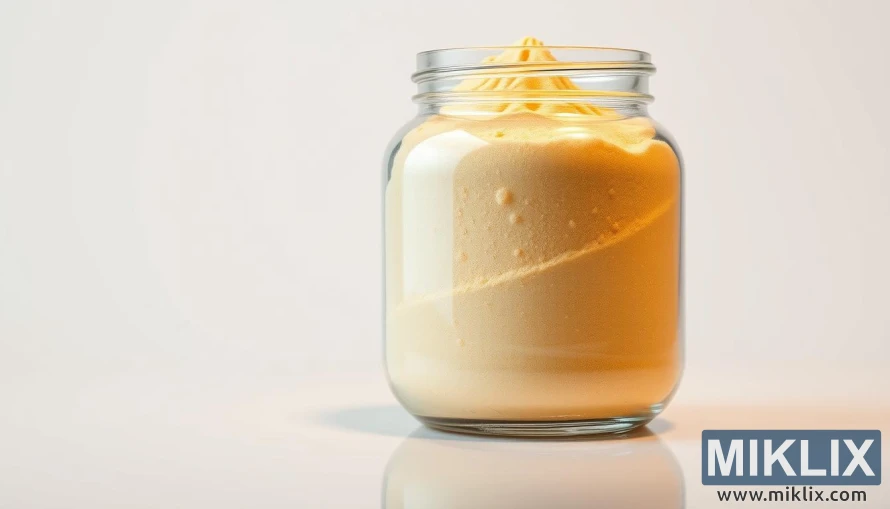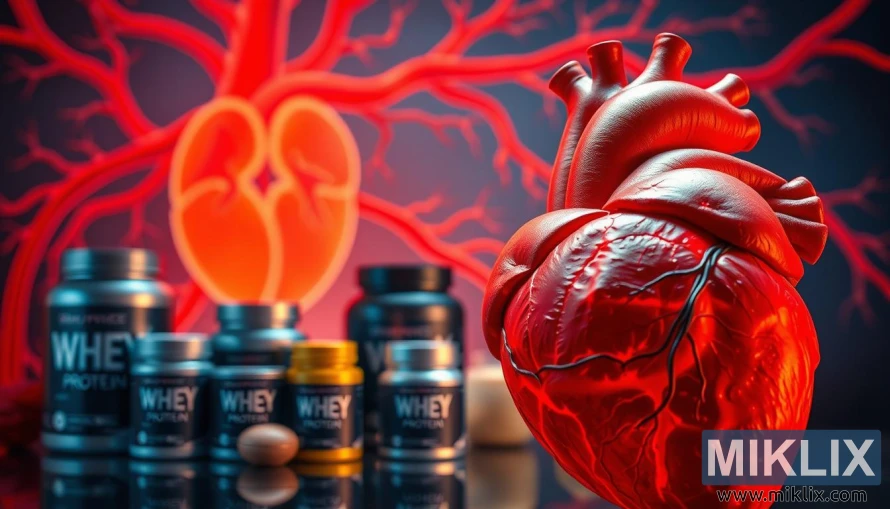From Muscle Fuel to Immune Boost: The Surprising Benefits of Whey Protein Explained
Published: June 18, 2025 at 8:31:43 AM UTC
Whey protein supplements have become popular for their numerous health benefits. They are known for aiding in muscle recovery and helping with weight management. These supplements are essential in the diets of athletes and those who prioritize health. This article delves into the various benefits of whey protein, including its nutritional value and its role in heart health and blood sugar control.

By examining the effectiveness of whey protein as a high-quality protein source, we uncover why it's a top choice for fitness and wellness goals. It's clear that whey protein supplements offer a wide range of advantages, making them a valuable addition to any diet.
Key Takeaways
- Whey protein supplements offer a range of health benefits.
- They support muscle recovery after workouts.
- Effective for weight management and maintaining a healthy diet.
- Contribute to cardiovascular health and blood sugar management.
- Widely used among athletes and fitness enthusiasts.
What is Whey Protein?
Whey protein is a high-quality dairy protein extracted from milk during cheese production. It separates from the curds and undergoes filtration to concentrate its protein content. This process makes whey protein a complete protein, rich in all nine essential amino acids vital for human health. Its low lactose content also makes it accessible to those with lactose intolerance.
Several sources of whey protein are available in the market. The primary types include:
- Whey Protein Concentrate: Contains about 70-80% protein and retains some fat and carbohydrates.
- Whey Protein Isolate: Offers a higher protein content of about 90%. This type has most of the fat and lactose removed.
- Whey Protein Hydrolysate: Pre-digested for faster absorption, making it easier on the digestive system.
The Nutritional Profile of Whey Protein
Whey protein is renowned for its exceptional nutritional profile. It is mainly composed of proteins, with about 65% beta-lactoglobulin, 25% alpha-lactalbumin, and 8% serum albumin. These components enhance its effectiveness as a dietary supplement for health and fitness improvement.
The branched-chain amino acids (BCAAs) in whey protein, such as leucine, isoleucine, and valine, are key. They are vital for muscle repair and energy production, making them essential for post-exercise recovery. This makes whey protein a top choice for athletes and fitness enthusiasts looking to enhance their performance.
Whey protein is not only efficient but also easy to digest. This makes it ideal for different diets. Adding whey protein to your daily routine can significantly increase your protein intake. It supports overall health and fitness goals effectively.
Whey Protein as a High-Quality Protein Source
Whey protein is celebrated for its complete amino acid profile and quick digestion. It outshines other proteins like casein and soy due to its high absorption rate. Its unique benefits significantly boost muscle protein synthesis, appealing to athletes and fitness buffs.
The protein content varies across the three main whey protein types:
- Whey Protein Concentrate: Contains approximately 58-89% protein content.
- Whey Protein Isolate: Offers about 90-95% protein content.
- Whey Protein Hydrolysate: Can provide up to 99% protein content.
This range allows consumers to pick based on their dietary needs and preferences. The emphasis on whey protein quality and its efficient digestion solidifies its position as a top protein source.

Benefits of Whey Protein for Muscle Growth
Whey protein is a powerful ally for those aiming to build muscle. Its high leucine content is key in stimulating protein synthesis. This process is vital for building and repairing muscle tissue. Studies show that combining whey protein with resistance training boosts muscle gains significantly.
This protein is not only for athletes; it also helps combat age-related muscle loss, or sarcopenia. Adding whey protein to a balanced diet supports muscle health. It ensures effective recovery after intense workouts.
Bodybuilders and fitness enthusiasts often turn to whey protein for its quick absorption and versatility. Incorporating whey protein shakes or supplements into a regular diet meets daily protein needs. This supports improved muscle growth and strength.
Whey Protein and Weight Management
Whey protein is a key ally for those aiming to lose weight. It boosts appetite control, aiding in the quest for a healthy weight. Its ability to induce feelings of fullness helps curb the urge to snack or overeat.
The high protein in whey protein is essential for fat loss and muscle preservation. Keeping muscle mass high is critical for metabolic health. A higher muscle mass means a more efficient metabolism, vital for long-term weight control and overall health.
Studies show that whey protein can lead to better weight loss outcomes. This effect is more pronounced when combined with healthy eating and regular exercise. For those seeking to improve their weight management, whey protein is a valuable addition to their diet.
Whey Protein for Cardiovascular Health
Studies show that whey protein can greatly benefit heart health. It has been linked to lower blood pressure, a vital factor for heart well-being. The unique bioactive peptides in whey, like lactokinins, are known for improving lipid profiles. This aids in better cholesterol management.
Adding whey protein to your diet may also lower inflammation, a key factor in preventing heart disease. This goes beyond just muscle repair, supporting a healthier heart function. For those looking to reduce cardiovascular risks, whey protein could be a valuable addition to their diet.

Managing Blood Pressure with Whey Protein
Whey protein shows promise in hypertension management. Studies suggest it may help lower blood pressure in those with high blood pressure. A review found that 30 grams of whey protein isolate daily for ten weeks significantly reduced systolic blood pressure.
The whey protein effects could be due to its peptides, which might act like ACE inhibitors. These are drugs used to treat high blood pressure. Yet, more research is needed to grasp the full impact of whey protein on blood pressure.
Whey Protein and Type 2 Diabetes Management
Whey protein supplementation brings numerous benefits for diabetes management. Studies show it can improve blood sugar control by boosting insulin sensitivity. This is key for those with type 2 diabetes, helping to regulate glucose levels effectively.
Whey protein's benefits don't stop at blood glucose. It also helps you feel full, aiding in calorie control. This is vital for those managing their weight alongside diabetes.
Its low carbohydrate content makes whey protein a great choice for those watching their carbs. It ensures adequate protein intake without causing blood sugar spikes, common with high-carb foods.
Whey Protein Benefits for Inflammatory Conditions
Chronic inflammation is a major risk factor for many health problems, including autoimmune diseases and chronic illnesses. Recent studies suggest that whey protein may help reduce inflammation due to its unique composition. This makes whey protein a valuable option for those with inflammatory conditions, potentially lowering inflammation markers.
Studies show that whey protein can decrease C-reactive protein (CRP) and interleukin-6 (IL-6) levels. These are key indicators of inflammation. Adding whey protein to one's diet could lead to better health, mainly for those battling chronic inflammation. Its anti-inflammatory properties make it a promising dietary choice for improving overall health and balancing inflammation.

Antioxidant Benefits of Whey Protein
Whey protein is celebrated for its robust antioxidant properties. It helps the body fight oxidative stress more effectively. This is mainly due to its ability to elevate glutathione levels, a critical element in protecting cells.
Glutathione, a potent antioxidant, battles free radicals. These harmful molecules cause cell damage and are linked to chronic diseases. By boosting glutathione, whey protein plays a significant role in cellular protection.
Studies suggest that whey protein can enhance the body's antioxidant defenses. Yet, more human research is needed to fully comprehend its benefits. Adding whey protein to your diet can be advantageous for those aiming to bolster their body's defenses against oxidative stress.
Whey Protein and Cholesterol Levels
Whey protein has become known for its role in managing cholesterol, focusing on lowering LDL cholesterol. Studies show that adding whey protein supplements to one's diet can lead to better cholesterol levels. A systematic review found that participants saw improvements in their lipid profiles. This includes lower levels of low-density lipoprotein cholesterol and triglycerides.
The benefits of whey protein go beyond muscle support and weight management. It positively impacts cardiovascular health. This improvement in lipid profiles can reduce the risk of heart-related diseases. For those aiming to enhance their overall health, whey protein is a compelling choice.
Improved Muscle Repair with Whey Protein
Whey protein is key for muscle repair, essential after intense workouts. Its unique structure allows for quick absorption, delivering amino acids to muscles swiftly. This rapid delivery is critical for post-exercise recovery, helping athletes regain strength and reduce soreness.
Whey protein's benefits go beyond muscle growth; it also minimizes muscle damage post-workout. Studies show that adding whey protein to recovery routines boosts muscle repair. This leads to less downtime and better performance over time.

In summary, whey protein is vital for those aiming to enhance muscle repair and recovery. It prepares the body for the next challenge, ensuring optimal performance.
Possible Side Effects of Whey Protein
Whey protein is a well-liked supplement known for its health benefits. Yet, it can cause side effects, mainly when taken in large amounts. These side effects often include gastrointestinal symptoms that can impact comfort and wellbeing.
People might feel discomfort in various ways:
- Bloating
- Cramping
- Flatulence
- Diarrhea
Those with lactose intolerance need to be careful. Whey protein concentrate has more lactose. On the other hand, whey protein isolate or hydrolysate has less lactose. This makes them better choices for those who are sensitive.
It's important for individuals with kidney or liver issues to talk to a healthcare professional before using whey protein. This advice ensures safety and helps avoid any health risks.
How to Incorporate Whey Protein into Your Diet
Adding whey protein to your diet is easy and boosts your nutrition. This versatile supplement can be mixed into many meals and snacks. Here are some tips to make it a part of your daily routine.
- Add whey protein to your morning smoothie for a nutritious start to the day.
- Mix it into oatmeal or yogurt for a filling breakfast.
- Include it in post-workout shakes to support muscle recovery.
- Use whey protein in baking, such as pancakes, muffins, or protein bars, to create delicious whey protein recipes.
- Blend it with your favorite nut butter for a tasty snack option.
To get the most out of whey protein, consume it after workouts and throughout the day. It's key to choose products with little added sugar, if you're watching your blood sugar. By following these tips, whey protein can easily become a regular part of your diet.
Conclusion
Whey protein emerges as a powerful dietary supplement, boasting a wide array of health benefits. It not only aids in muscle growth but also plays a key role in weight management and heart health. This makes it a top pick for fitness buffs and anyone looking to boost their nutrition.
The high digestibility and complete amino acid profile of whey protein highlight its value. It's perfect for post-workout recovery or improving fitness levels. Yet, it's important to be aware of possible side effects to use it effectively.
Adding whey protein to your diet can significantly enhance your health journey. It helps in achieving various health goals, from exercise recovery to weight control, and maintaining a balanced diet. By embracing this versatile protein, you can unlock its many benefits and seamlessly integrate it into your daily routine.
Further Reading
If you enjoyed this post, you may also like these suggestions:
- Blueberries: Nature’s Tiny Health Bombs
- From Salad Dressing to Daily Dose: Surprising Benefits of Apple Cider Vinegar Supplements
- Unlock Calm and Vitality: How Ashwagandha Enhances Mind, Body, and Mood
